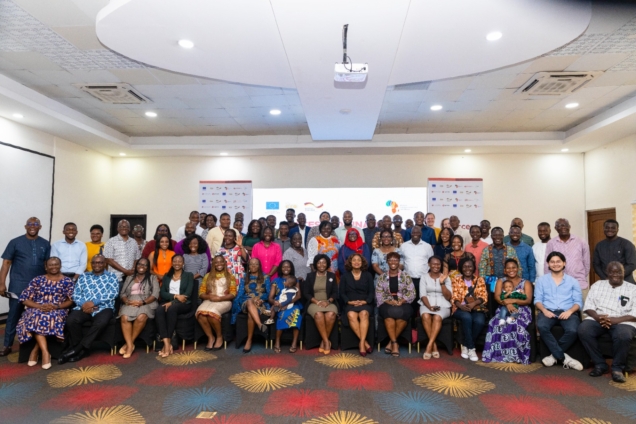A high-level access to finance policy dialogue has been held in Accra to develop a strategic roadmap on reducing the cost of financing for micro, small, and medium enterprises.
Ghana is one of the top three countries in the world with the most women entrepreneurs (Mastercard Index of Women Entrepreneurs, 2021), yet women entrepreneurs face numerous financing challenges. The dialogue sought to promote discussions on existing access to finance and market gaps for MSMEs and tailor-made solutions.
The Access to Finance Policy Dialogue was on the theme “Reducing the cost of capital in Ghana.” It is organised by the Women Entrepreneurship for Africa (WE4A) programme, an initiative of the German Federal Ministry for Economic Cooperation and Development (BMZ). The project is co-funded by the European Union (EU), the Organisation of African, Caribbean, and Pacific State (OACPS), and implemented by the Deutsche Gesellschaft für Internationale Zusammenarbeit (GIZ) GmbH and the Tony Elumelu Foundation.
According to the World Bank, women entrepreneurs play a critical role in economic development. They boost growth and create jobs, particularly for the poorest 40% of the population. Yet, women entrepreneurs face numerous challenges to financing.
The dialogue hosted several panel discussions on the cost of credit, the factors that drive cost, the availability of credit, and the development of customised financial products tailored specifically for MSMEs.
Small and medium enterprises (SMEs) account for over 90% of firms globally. However, SMEs face greater financing obstacles than larger firms—they enjoy less access to external finance and face higher transactions costs and higher risk premiums (World Bank,2023). Almost 70% of SMEs do not use external financing from financial institutions, and another 15% are underfinanced. The total credit required to finance these SMEs fully is over $2 trillion, equivalent to 14% of the GDP of developing economies.
The Access to Finance Policy Dialogue brought together key policy makers, entrepreneurship support organisations, funders, intermediaries, transaction advisors, and entrepreneurs. Highlights included the introduction of a range of innovative solutions aimed at strengthening the financial stability of MSMEs in Ghana.
The WE4A Programme is a collaborative initiative supported by the European Union, the Organization of African, Caribbean, and Pacific States, and the German Federal Ministry for Economic Cooperation and Development. Its mission is to empower African women entrepreneurs, foster economic growth, and promote gender equality in entrepreneurship through targeted training, financial support, and partnerships with the private sector.
Latest Stories
-
Samsung’s AI-powered innovations honored by Consumer Technology Association
18 mins -
Fugitive Zambian MP arrested in Zimbabwe – minister
36 mins -
Town council in Canada at standstill over refusal to take King’s oath
47 mins -
Trump picks Pam Bondi as attorney general after Matt Gaetz withdraws
59 mins -
Providing quality seeds to farmers is first step towards achieving food security in Ghana
1 hour -
Gary Gensler to leave role as SEC chairman
2 hours -
Contraceptive pills recalled in South Africa after mix-up
2 hours -
Patient sues Algerian author over claims he used her in novel
2 hours -
Kenya’s president cancels major deals with Adani Group
2 hours -
COP29: Africa urged to invest in youth to lead fight against climate change
2 hours -
How Kenya’s evangelical president has fallen out with churches
2 hours -
‘Restoring forests or ravaging Ghana’s green heritage?’ – Coalition questions Akufo-Addo’s COP 29 claims
3 hours -
Ensuring peaceful elections: A call for justice and fairness in Ghana
4 hours -
Inside South Africa’s ‘ruthless’ gang-controlled gold mines
4 hours -
Give direct access to Global Health Fund – Civil Society calls allocations
4 hours

